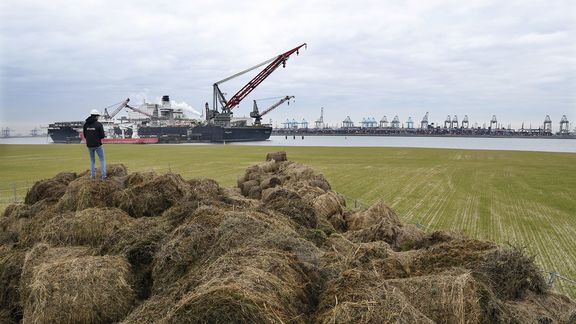Port Authority enriching Maasvlakte soil with ‘homemade’ bokashi
By way of experiment, the Port of Rotterdam Authority has started to produce and spread bokashi: a special soil conditioner made from various types of vegetable waste, including prunings, dry leaves and grass. After being ‘harvested’ across the port and industrial area, the organic residual flows are shredded and anaerobically fermented. Some 8 to 12 weeks later, this process yields bokashi, which is spread across various unallocated sites at Maasvlakte 2 to counter drifting sand. This in turn preserves the grass planted at these plotss.
Every year, the Port Authority discards tonnes of organic matter. The current trial, which will last until the end of December, is a first attempt at finding better purposes for these residuals, which would otherwise go to waste. The production and utilisation of bokashi is in line with the Port Authority’s focus on the sustainable development of attractive outdoor areas.

Japanese
The Japanese word bokashi means ‘properly fermented organic matter’. In this procedure, organic matter is inoculated with various elements, including microorganisms, and sealed in an airtight vessel. This specific composting technique greatly speeds up the fermentation process. In addition, the original volume of organic matter remains more or less unaltered. Bokashi can be used to convert organic waste into nutrition for soil life. After 8 to 12 weeks, the freshly fermented soil conditioner is ready for application, serving as a fertile source of nutrition for certain earthworm species that tunnel deep into the soil. These animals in turn enrich the soil with oxygen.
The advantages of bokashi:
- A rich source of nutrition for soil life
- Virtual no loss of mass between input and output
- Prevents growth of harmful bacteria and fungi
- Rapidly decomposes after being added to the soil
- Cost-effective compared to traditional processing methods
- Source of nutrients for soil life. This makes bokashi highly suited as a soil amendment for sites. In addition, bokashi discourages weed seeds from germinating in the soil. Instead, they start to ferment in the layer of bokashi.